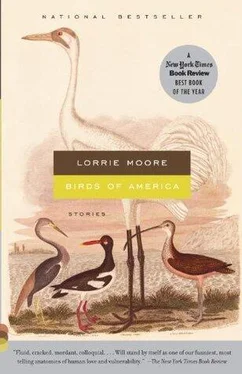PEOPLE LIKE THAT ARE THE ONLY PEOPLE HERE: CANONICAL BABBLING IN PEED ONK
A beginning, an end: there seems to be neither. The whole thing is like a cloud that just lands and everywhere inside it is full of rain. A start: the Mother finds a blood clot in the Baby’s diaper. What is the story? Who put this here? It is big and bright, with a broken khaki-colored vein in it. Over the weekend, the Baby had looked listless and spacey, clayey and grim. But today he looks fine — so what is this thing, startling against the white diaper, like a tiny mouse heart packed in snow? Perhaps it belongs to someone else. Perhaps it is something menstrual, something belonging to the Mother or to the Babysitter, something the Baby has found in a wastebasket and for his own demented baby reasons stowed away here. (Babies: they’re crazy! What can you do?) In her mind, the Mother takes this away from his body and attaches it to someone else’s. There. Doesn’t that make more sense?
· · ·
Still, she phones the clinic at the children’s hospital. “Blood in the diaper,” she says, and, sounding alarmed and perplexed, the woman on the other end says, “Come in now.”
Such pleasingly instant service! Just say “blood.” Just say “diaper.” Look what you get!
In the examination room, pediatrician, nurse, head resident — all seem less alarmed and perplexed than simply perplexed. At first, stupidly, the Mother is calmed by this. But soon, besides peering and saying “Hmmmm,” the pediatrician, nurse, and head resident are all drawing their mouths in, bluish and tight — morning glories sensing noon. They fold their arms across their white-coated chests, unfold them again and jot things down. They order an ultrasound. Bladder and kidneys. “Here’s the card. Go downstairs; turn left.”
In Radiology, the Baby stands anxiously on the table, naked against the Mother as she holds him still against her legs and waist, the Radiologist’s cold scanning disc moving about the Baby’s back. The Baby whimpers, looks up at the Mother. Let’s get out of here , his eyes beg. Pick me up! The Radiologist stops, freezes one of the many swirls of oceanic gray, and clicks repeatedly, a single moment within the long, cavernous weather map that is the Baby’s insides.
“Are you finding something?” asks the Mother. Last year, her uncle Larry had had a kidney removed for something that turned out to be benign. These imaging machines! They are like dogs, or metal detectors: they find everything, but don’t know what they’ve found. That’s where the surgeons come in. They’re like the owners of the dogs. “Give me that,” they say to the dog. “What the heck is that?”
“The surgeon will speak to you,” says the Radiologist.
“Are you finding something?”
“The surgeon will speak to you,” the Radiologist says again. “There seems to be something there, but the surgeon will talk to you about it.”
“My uncle once had something on his kidney,” says the Mother. “So they removed the kidney and it turned out the something was benign.”
The Radiologist smiles a broad, ominous smile. “That’s always the way it is,” he says. “You don’t know exactly what it is until it’s in the bucket.”
“ ‘In the bucket,’ ” the Mother repeats.
The Radiologist’s grin grows scarily wider — is that even possible? “That’s doctor talk,” he says.
“It’s very appealing,” says the Mother. “It’s a very appealing way to talk.” Swirls of bile and blood, mustard and maroon in a pail, the colors of an African flag or some exuberant salad bar: in the bucket —she imagines it all.
“The Surgeon will see you soon,” he says again. He tousles the Baby’s ringletty hair. “Cute kid,” he says.
“Let’s see now,” says the Surgeon in one of his examining rooms. He has stepped in, then stepped out, then come back in again. He has crisp, frowning features, sharp bones, and a tennis-in-Bermuda tan. He crosses his blue-cottoned legs. He is wearing clogs.
The Mother knows her own face is a big white dumpling of worry. She is still wearing her long, dark parka, holding the Baby, who has pulled the hood up over her head because he always thinks it’s funny to do that. Though on certain windy mornings she would like to think she could look vaguely romantic like this, like some French Lieutenant’s Woman of the Prairie, in all of her saner moments she knows she doesn’t. Ever. She knows she looks ridiculous — like one of those animals made out of twisted party balloons. She lowers the hood and slips one arm out of the sleeve. The Baby wants to get up and play with the light switch. He fidgets, fusses, and points.
“He’s big on lights these days,” explains the Mother.
“That’s okay,” says the Surgeon, nodding toward the light switch. “Let him play with it.” The Mother goes and stands by it, and the Baby begins turning the lights off and on, off and on.
“What we have here is a Wilms’ tumor,” says the Surgeon, suddenly plunged into darkness. He says “tumor” as if it were the most normal thing in the world.
“Wilms’?” repeats the Mother. The room is quickly on fire again with light, then wiped dark again. Among the three of them here, there is a long silence, as if it were suddenly the middle of the night. “Is that apostrophe s or s apostrophe?” the Mother says finally. She is a writer and a teacher. Spelling can be important — perhaps even at a time like this, though she has never before been at a time like this, so there are barbarisms she could easily commit and not know.
The lights come on: the world is doused and exposed.
“ S apostrophe,” says the Surgeon. “I think.” The lights go back out, but the Surgeon continues speaking in the dark. “A malignant tumor on the left kidney.”
Wait a minute. Hold on here. The Baby is only a baby, fed on organic applesauce and soy milk — a little prince! — and he was standing so close to her during the ultrasound. How could he have this terrible thing? It must have been her kidney. A fifties kidney. A DDT kidney. The Mother clears her throat. “Is it possible it was my kidney on the scan? I mean, I’ve never heard of a baby with a tumor, and, frankly, I was standing very close.” She would make the blood hers, the tumor hers; it would all be some treacherous, farcical mistake.
“No, that’s not possible,” says the Surgeon. The light goes back on.
“It’s not?” says the Mother. Wait until it’s in the bucket , she thinks. Don’t be so sure. Do we have to wait until it’s in the bucket to find out a mistake has been made?
“We will start with a radical nephrectomy,” says the Surgeon, instantly thrown into darkness again. His voice comes from nowhere and everywhere at once. “And then we’ll begin with chemotherapy after that. These tumors usually respond very well to chemo.”
“I’ve never heard of a baby having chemo,” the Mother says. Baby and Chemo , she thinks: they should never even appear in the same sentence together, let alone the same life. In her other life, her life before this day, she had been a believer in alternative medicine. Chemotherapy? Unthinkable. Now, suddenly, alternative medicine seems the wacko maiden aunt to the Nice Big Daddy of Conventional Treatment. How quickly the old girl faints and gives way, leaves one just standing there. Chemo? Of course: chemo! Why by all means: chemo. Absolutely! Chemo!
The Baby flicks the switch back on, and the walls reappear, big wedges of light checkered with small framed watercolors of the local lake. The Mother has begun to cry: all of life has led her here, to this moment. After this, there is no more life. There is something else, something stumbling and unlivable, something mechanical, something for robots, but not life. Life has been taken and broken, quickly, like a stick. The room goes dark again, so that the Mother can cry more freely. How can a baby’s body be stolen so fast? How much can one heaven-sent and unsuspecting child endure? Why has he not been spared this inconceivable fate?
Читать дальше












